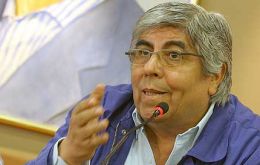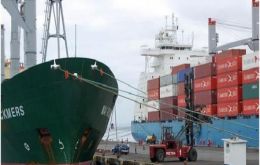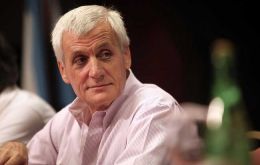MercoPress. South Atlantic News Agency
Tag: Indec
-
Wednesday, August 22nd 2012 - 05:12 UTC
Argentina consumers’ 12-month inflation expectations reach 39.8%

Argentine consumers’ inflation expectations for the next twelve months reached a record of 39.8% climbing for the third month running, according to the latest release from the University of Torcuato Di Tella.
-
Saturday, August 18th 2012 - 06:18 UTC
Argentina manages a 7.3bn dollars surplus in first half of the year

Argentina trade surplus in the first half of the year reached 7.336 billion dollars, up 26.8% over the same period a year ago, with exports reaching 39.647bn dollars and imports 32.311bn, according to the official stats office Indec.
-
Saturday, August 18th 2012 - 06:00 UTC
Conflicting reports on Argentine performance, but economy rapidly slowing

Argentina's economic activity remained flat in June compared to a year ago, according to the latest release from the country’s questioned stats office, Indec. The EMAE economic activity index, a close proxy for GDP published on Friday showed a 1.1% expansion in June versus May and 2.5% in the first half of the year.
-
Saturday, August 11th 2012 - 10:45 UTC
Official (fantasy) inflation in Argentina 0.8% in July and 9.9% last 12 months

Official consumer inflation in Argentina reached 0.8% in July accumulating 9.9% in the last twelve months and 5.9% in the first seven months of the year, according to the Indec statistics bureau.
-
Friday, August 10th 2012 - 07:21 UTC
Argentine private agencies July inflation 1.76% and 24.13% in twelve months

Argentine opposition lawmakers presented on Thursday July’s inflation index based in the analysis of nine private agencies, which showed a 1.76% increase against the previous month and doubles the official index from the government of President Cristina Fernandez.
-
Thursday, August 9th 2012 - 06:47 UTC
For Argentine unions, food basket inflation is 52% higher than the official index

Argentine organized labour CGT, announced that based on their own analysis of the products that make up the basic food basket, on average they are 52% more expensive than those analyzed by the official statistics office, Indec
-
Wednesday, August 1st 2012 - 11:48 UTC
Argentine construction activity slows down for third month running

Argentine construction activity in Argentina during June dropped for the third consecutive month compared to a year ago. The drop was 1.5% according to the Construction Activity Synthetic Index (ISAC) from the country’s stats office, Indec.
-
Friday, July 27th 2012 - 05:10 UTC
Argentine union leader confesses he never believed in the “official inflation rate”

Argentina’s Metal workers union (UOM) leader Antonio Caló said on Thursday he “never believed in the (official stats office) Indec” and openly estimated that inflation in the country is running at “23% to 24%”.
-
Friday, July 20th 2012 - 08:27 UTC
Argentines inflation expectations for the next 12 months in July climbed to 35.7%

Argentines inflation expectation for the next twelve months climbed in July to 35.7% from 34.9% in June according to the latest report form the Di Tella University Finance research centre (UTDT).
-
Wednesday, July 18th 2012 - 08:37 UTC
Argentina’s industrial production in May slumped 5.1%, says Industrial Union

Argentina's industrial production in May slumped 5.1% from a year earlier due to a sharp slowdown in the automotive, non-metal minerals and base metals sectors, manufacturer chamber UIA said in its monthly report Tuesday.
